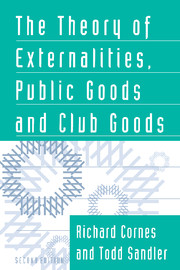Book contents
- Frontmatter
- Contents
- List of tables and figures
- Preface
- Part I Introduction to the theory of externalities, public goods, and club goods
- Part II Externalities
- Part III Public goods
- 6 Pure public goods: Nash-Cournot equilibria and Pareto optimality
- 7 Alternative mechanisms for provision of public goods
- 8 Public goods in general
- 9 Game theory and public goods
- 10 Departures from Nash-Cournot behavior
- Part IV Clubs and club goods
- Part V Applications and future directions
- References
- Author index
- Subject index
8 - Public goods in general
Published online by Cambridge University Press: 05 June 2012
- Frontmatter
- Contents
- List of tables and figures
- Preface
- Part I Introduction to the theory of externalities, public goods, and club goods
- Part II Externalities
- Part III Public goods
- 6 Pure public goods: Nash-Cournot equilibria and Pareto optimality
- 7 Alternative mechanisms for provision of public goods
- 8 Public goods in general
- 9 Game theory and public goods
- 10 Departures from Nash-Cournot behavior
- Part IV Clubs and club goods
- Part V Applications and future directions
- References
- Author index
- Subject index
Summary
The model of a pure public good that we introduced in Chapter 6 is undoubtedly a simple and very special case. In this chapter we explore a number of extensions and modifications of the basic model. Our explorations follow two lines of inquiry. First, recall that we characterized a pure public good as having two properties – nonrivalry and nonexcludability. The first of these states that consumption of the good by one individual does not reduce the quantity available to others, so that its benefits can be made available to all. The second refers to the assumption that these benefits not only can be, but in fact are, made available to all. It is easy to think of commodities that generate nonrival benefits from which exclusion is not only possible but actually takes place. Enjoyment of a radio or television program by one consumer does not inherently reduce the service available to others. However, providers of these services often find it worthwhile to expend resources policing access and excluding nonpayers. Developments in electronic scrambling technology make it a simple and cheap matter to exclude nonpayers. More generally, patents and copyrights serve to restrict the uses to which payers can put nonrival services, thereby restricting access by other parties. It would seem that the ability to exact payment from those who consume a nonrival service should strengthen incentives to provide it and at least mitigate, if not totally overcome, the tendency toward underprovision.
- Type
- Chapter
- Information
- The Theory of Externalities, Public Goods, and Club Goods , pp. 240 - 299Publisher: Cambridge University PressPrint publication year: 1996
- 1
- Cited by



